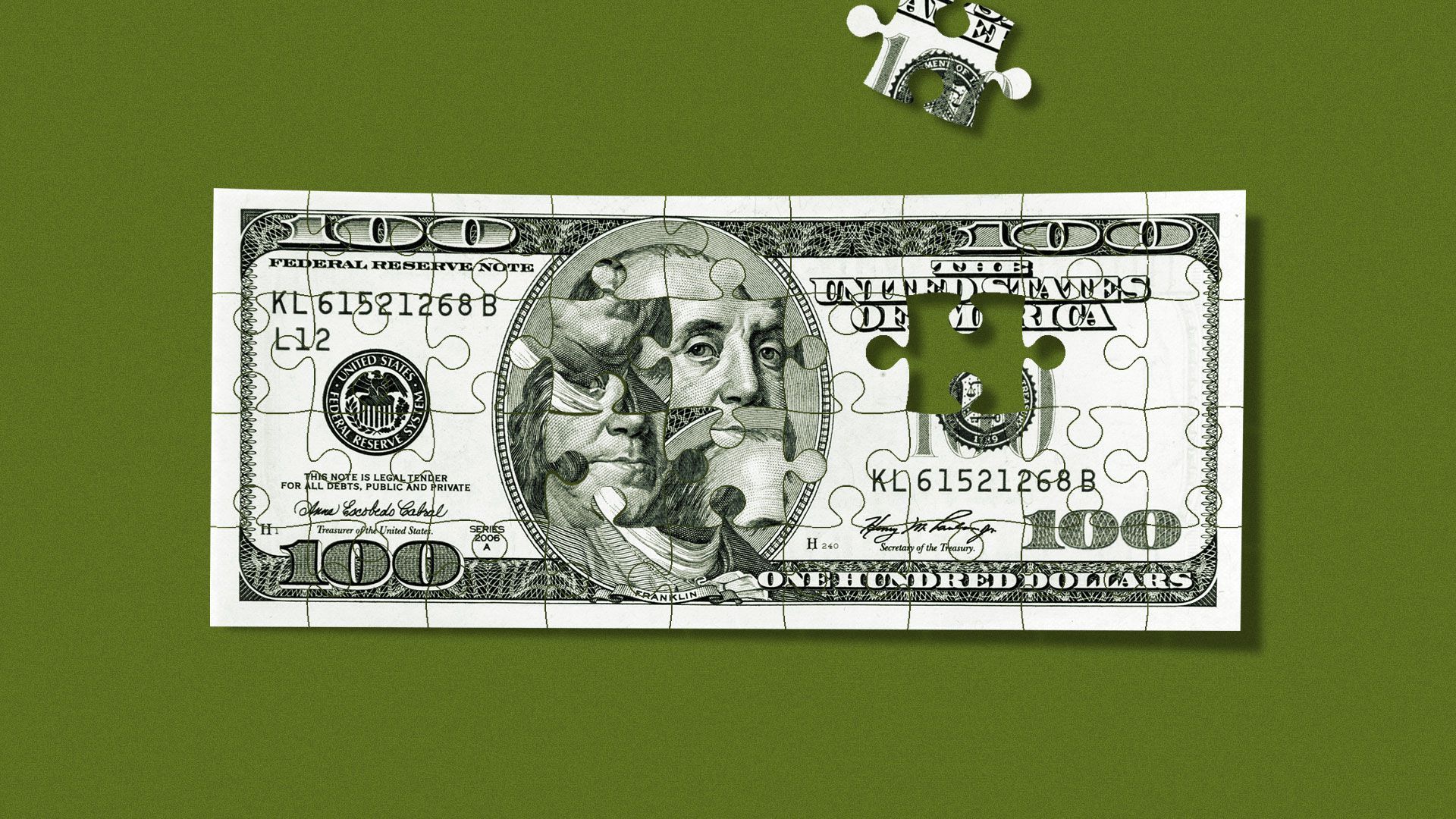| | | | | | | Presented By Goldman Sachs | | | | Axios Markets | | By Dion Rabouin ·Dec 03, 2020 | | Good morning! Was this email forwarded to you? Sign up here. (Today's Smart Brevity count: 1,334 words, 5 minutes.) Situational awareness: More than 5.2 million companies received loans from the Paycheck Protection Program, but the first full accounting of the data from the SBA shows that more than 25% of the $523 billion went to 1% of borrowers. (N.Y. Times) 🎙 "Right is of no sex—Truth is of no color—God is the Father of us all, and we are brethren." — See who said it and why it matters at the bottom. | | | | | | 1 big thing: Our make-believe economy is here to stay |  | | | Illustration: Eniola Odetunde/Axios | | | | The Federal Reserve and global central banks are remaking the world's economy in an effort to save it, but have created something of a monster as they roll out ever-larger sums of new money to prop up an increasing number of distressed companies. Why it matters: The Fed-driven economy relies on the creation of trillions of dollars — literally out of thin air — that are used to purchase bonds and push money into a pandemic-ravaged economy that has long been dependent on free cash and is only growing more addicted. - However, most of the money gets stuck at the top — winding up in the accounts of large corporations and highly paid executives, while leaving behind small businesses and everyday Americans.
What's happening: Stocks are hitting all-time highs while millions remain out of work and on unemployment insurance. That's not a coincidence. - Companies' lean bottom lines (i.e. shortage of expensive workers) are a major reason investors are so bullish on equity prices.
How it works: It's cheaper than ever for companies to borrow money because the Fed has set interest rates at effectively 0% and has promised to buy unlimited government bonds and an unspecified amount of corporate bonds. So companies have issued unprecedented debt and loaded up their balance sheets. - But they're not using their Fed-backed cash piles to hire more workers or increase salaries. In fact, many are doing the opposite — driving down their "operating leverage" by "cost cutting through labor force reduction and refinancing of debt," notes John Lynch, chief investment officer at Comerica Asset Management.
- Add to that years of companies buying back their own shares to juice stock prices higher, and "we essentially have more dollars chasing fewer shares because of buybacks and [the Fed's] liquidity increases," Lynch tells Axios.
Between the lines: It's a Goldilocks environment for stocks, but a bearish one for workers. - Because executive pay is largely determined by companies' stock prices, it's much more lucrative for top execs to buy back their stock than it is to hire more workers or invest in projects that require a larger workforce.
Watch this space: During his testimony with the House Committee on Financial Services Wednesday, Fed chair Jerome Powell assured Congress that the Fed would remain on its current policy path "well into the future." The bottom line: "The socialization of debt by the Fed is fundamentally reshaping how the quote 'free market' system works," Scott Minerd, CIO at Guggenheim Partners, told Axios last month. - "And as Milton Friedman said, nothing is so permanent as a temporary government program."
|     | | | | | | Bonus chart: The Fed's balance sheet — how we got here |  Data: FRED; Chart: Axios Visuals Even with all the Fed has done, the economy is still too weak to stand on its own, economists argue. - "It's easy to forget how weak much of the underlying economy is when we see a booming stock market and good data coming from areas such as housing and manufacturing," Robert Frick, corporate economist at Navy Federal Credit Union, tells Axios.
- "But with sectors of the economy such as travel, restaurants and lodging still beaten down by the pandemic, and more than 10 million Americans unemployed who had jobs in February, those low interest rates and other Fed supports are obviously needed to keep the economy from slipping back into recession."
|     | | | | | | 2. Catch up quick | | The House approved legislation that could lead to Chinese companies including Alibaba and Baidu getting kicked off U.S. exchanges if regulators aren't allowed to review their financial audits. (Bloomberg) The chief scientific adviser to the government's Operation Warp Speed said the FDA is unlikely to authorize AstraZeneca's COVID-19 vaccine prior to completion of a larger U.S. trial in coming months. (WSJ) U.S. pay-TV subscribers will soon see refunds and credits worth as much as $1.1 billion for pandemic-related sports cancellations. (Bloomberg) |     | | | | | | A message from Goldman Sachs | | The U.S.'s second-largest public pension fund's view on 2021 | | |  | | | | CalSTRS Chief Investment Officer Chris Ailman joins Goldman Sachs' Insights from Great Investors to discuss his long-term outlook on investing and how he has incorporated ESG into his strategy. Find out what makes a successful investor. | | | | | | 3. USPS delays announcement on possible electric vehicle fleet deal |  Data: FactSet; Chart: Axios Visuals The U.S. Postal Service is likely to be upgrading its fleet of trucks with electric vehicles soon, but the decision has been pushed back to next year. Driving the news: USPS told automotive website Trucks.com on Tuesday that it expects to announce which companies it will select for a potentially $6 billion deal to build as many as 180,000 delivery vans in the second fiscal quarter of 2021. - USPS has now delayed the decision multiple times.
What we're hearing: Electric truck maker Workhorse, one of the three companies still competing for the bid, was tightlipped about the future of the deal, but did reveal that it is still in the running and awaiting word from USPS. - "We're under an NDA with the post office. The post office has announced at different times when the award will be made but it's really all in the post office's hands," CFO Steve Schrader told me in an exclusive video interview for the Voices of Wall Street podcast.
- Workhorse also has agreements in place to deliver vehicles to UPS and DHL, Schrader said, and is aiming to produce 1,800 vehicles next year.
On the low: Cowen analyst Jeffrey Osborne, who is bullish on the stock and gives it an Outperform rating, says Workhorse is still well-positioned to capture up to 60%-70% of the post office's fleet once a decision is finally made. What's next: Workhorse is the only U.S. EV company remaining in contention for the contract, Trucks.com reported. - Turkish electric vehicle maker Karsan, which teamed with long-time USPS supplier Morgan Olson of Michigan, and Oshkosh Corp., from Wisconsin, which has teamed up with Ford for an internal combustion offering, are the two remaining companies in competition.
By the numbers: Workhorse's stock fell 19% on Wednesday after the USPS news, its sixth straight session in the red. However, the stock is still up 600% year to date, down from an 850% gain as of Nov. 23. |     | | | | | | 4. Fed's Beige Book shows trouble brewing | | The Fed's latest survey of its business contacts around the country revealed a weakening labor market that could give the central bank grounds to ramp up its massive bond-buying program when its policy-setting committee meets later this month. What happened: While most districts said they were still seeing a modest or moderate economic expansion, four districts described little or no growth. - The Philadelphia district as well as three of the four districts in the Midwest said that activity began to slow in early November as COVID-19 cases surged.
- Banking contacts in multiple districts reported some deterioration of loan portfolios, especially in commercial lending into the retail and leisure and hospitality sectors, and said an increase in delinquencies in 2021 is widely anticipated.
- Most districts reported that firms' outlooks remained positive, but optimism had waned.
- Nearly all districts reported that employment rose, but for most, the pace was slow, at best, and the recovery remained incomplete.
One level deeper: "Altogether, the December Beige Book is consistent with our view of a modest deceleration in economic activity in recent weeks due to new COVID-19 cases, increased restrictions on activity and waning fiscal support," Lewis Alexander, U.S. chief economist at Nomura, said in a note to clients. The intrigue: Before the Beige Book's release, analysts at TD Securities noted, "We expect the Fed to take further easing action in December by extending the maturity of QE purchases." |     | | | | | | 5. The silver lining in 2020's weak Black Friday sales |  Data: Placer.ai; Chart: Axios Visuals Black Friday was disappointing for retailers this year, as spending numbers disappointed and foot traffic declined dramatically, according to data from analytics firm Placer.ai. By the numbers: Customer visits were down, on average, more than 26% compared to Black Friday 2019 at the six retailers Placer tracked. The big picture: The National Retail Federation said Tuesday that more than 186 million shoppers purchased something online or in-store from Thanksgiving through Cyber Monday, down from 190 million a year ago. - Shoppers spent an average of $312, a 14% decline from $362 in 2019.
What they're saying: "It's going to be a tough holiday season for most retailers," Paula Rosenblum, managing partner at RSR Research, told the Washington Post. - "Target, Walmart, grocers and sporting goods stores are cleaning up, but hundreds of thousands of independent retailers have already gone out of business. Things are going to get worse before they get better."
Yes, but: Retailers didn't roll out the red carpet on sales and consumers still came. The 186.4 million shoppers this year was down from 2019 but significantly higher than the 165.8 million shoppers in 2018. - "As we've been suggesting since early pandemic days, when retailers stopped ordering product, manufacturers stopped making it, triggering broad-based inventory scarcity and allowing retailers a unique opportunity to pull back on promotions, regain pricing power, and elevate profits," BMO Capital Markets' Simeon Siegel told Barron's.
|     | | | | | | A message from Goldman Sachs | | What's on the minds of some of the world's great investors? | | |  | | | | Each week, Goldman Sachs brings viewers an interview with leading private and public investors. Why it's important: Some of the world's greatest investors will provide insight on their investing philosophies and how they are approaching the new investing landscape. Explore their insights. | | | | Thanks for reading! Quote: "Right is of no sex—Truth is of no color—God is the Father of us all, and we are brethren." Why it matters: On Dec. 3, 1847, abolitionist and former slave Frederick Douglass debuted The North Star newspaper, which soon became one of the most influential antislavery publications of the pre-Civil War era. - Douglass published the paper using funds he earned during a speaking tour of the U.K. and Ireland.
- The name of the newspaper paid homage to the fact that escaping slaves used the North Star in the night sky to guide them to freedom.
- The quote is the newspaper's motto.
| | | | Axios thanks our partners for supporting our newsletters.
Sponsorship has no influence on editorial content. Axios, 3100 Clarendon Blvd, Suite 1300, Arlington VA 22201 | | | You received this email because you signed up for newsletters from Axios.
Change your preferences or unsubscribe here. | | | Was this email forwarded to you?
Sign up now to get Axios in your inbox. | | | | Follow Axios on social media:    | | | | | |
No comments:
Post a Comment